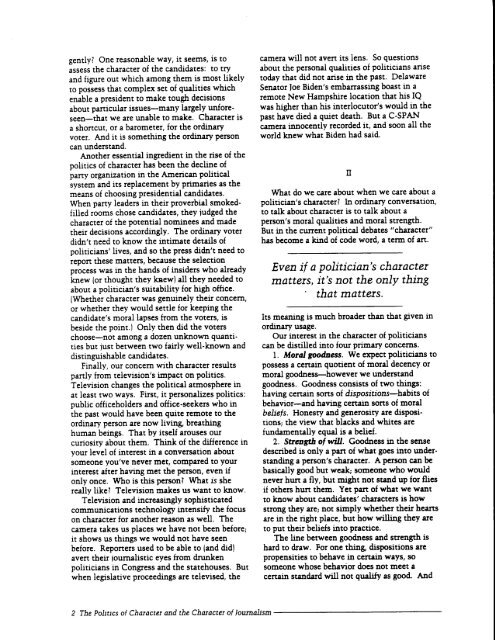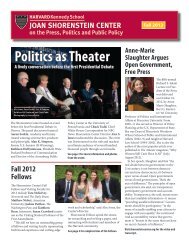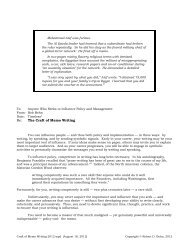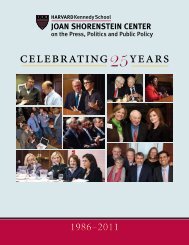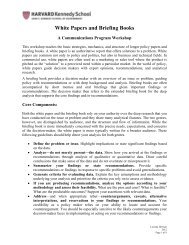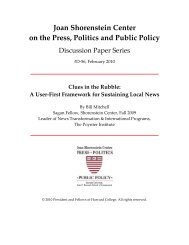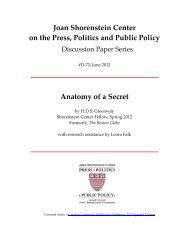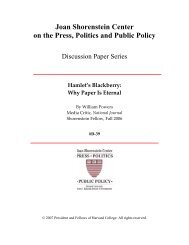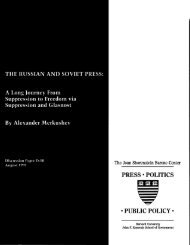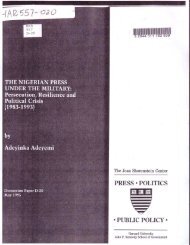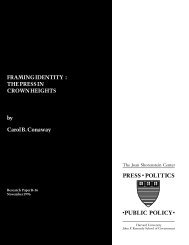PUBLIC POLICY - Joan Shorenstein Center on the Press, Politics ...
PUBLIC POLICY - Joan Shorenstein Center on the Press, Politics ...
PUBLIC POLICY - Joan Shorenstein Center on the Press, Politics ...
You also want an ePaper? Increase the reach of your titles
YUMPU automatically turns print PDFs into web optimized ePapers that Google loves.
gently? One reas<strong>on</strong>able way, it seems, is to<br />
assess <strong>the</strong> character of <strong>the</strong> candidates: to try<br />
and figure out which am<strong>on</strong>S <strong>the</strong>m is most likely<br />
ro possess that complex set of qualities which<br />
enable a president to make tough decisi<strong>on</strong>s<br />
about particular issues-many largely unforeseen-that<br />
we are unable to make. Character is<br />
a shortcut, or a barometer, for <strong>the</strong> ordinary<br />
voter. And it is something <strong>the</strong> ordinary pers<strong>on</strong><br />
can understand.<br />
Ano<strong>the</strong>r essential ingredient in <strong>the</strong> rise of tbe<br />
politics of character has been <strong>the</strong> decline of<br />
pany organizati<strong>on</strong> in <strong>the</strong> American political<br />
system and its replacement by primaries as <strong>the</strong><br />
means of choosing presidential candidates.<br />
When pany leaders rn <strong>the</strong>ir proverbial smoked'<br />
filled rooms chose candidates, <strong>the</strong>y iudged <strong>the</strong><br />
character of <strong>the</strong> potential nominees and made<br />
<strong>the</strong>ir decisi<strong>on</strong>s accordingly. The ordinary voter<br />
didn't need to know <strong>the</strong> rntimate details of<br />
politicians' lives, and so <strong>the</strong> press didn't need to<br />
report <strong>the</strong>se matters, because <strong>the</strong> selecti<strong>on</strong><br />
process was in <strong>the</strong> hands of insiders who already<br />
knew (or thought <strong>the</strong>y knewl all <strong>the</strong>y needed to<br />
about a politician's suitability for high office.<br />
(Whe<strong>the</strong>r character was genuinely <strong>the</strong>ir c<strong>on</strong>cem,<br />
or whe<strong>the</strong>r <strong>the</strong>y would settle for keeping <strong>the</strong><br />
candidate's moral lapses from <strong>the</strong> voters, is<br />
beside <strong>the</strong> point.l Only <strong>the</strong>n did <strong>the</strong> votels<br />
choose-not am<strong>on</strong>g a dozen unknown quanti'<br />
ties but iust between two fairly well-known and<br />
distingurshable candidates.<br />
Finally, our c<strong>on</strong>cem with character results<br />
panly from televisi<strong>on</strong>'s impact <strong>on</strong> politics.<br />
Televisi<strong>on</strong> changes <strong>the</strong> political atmosphere in<br />
at least two ways. First, it pers<strong>on</strong>alizes politics:<br />
public officeholders and office-seekers who in<br />
<strong>the</strong> past would have been quite remote to <strong>the</strong><br />
ordinary pers<strong>on</strong> are now living breathing<br />
human beings. That by itself arouses our<br />
cunosity about <strong>the</strong>m. Think of <strong>the</strong> difference in<br />
your Ievel of interest in a c<strong>on</strong>versati<strong>on</strong> about<br />
some<strong>on</strong>e you've never met, compared to your<br />
rnterest after having met <strong>the</strong> pers<strong>on</strong>, even iI<br />
<strong>on</strong>ly <strong>on</strong>ce. Who is this pers<strong>on</strong>l What is she<br />
really like? Televisi<strong>on</strong> makes us want to know.<br />
Televisi<strong>on</strong> and increasingly sophisticated<br />
communicati<strong>on</strong>s technology rntensify <strong>the</strong> focus<br />
<strong>on</strong> character for ano<strong>the</strong>r reas<strong>on</strong> as weli. The<br />
camera takes us places we have not been before;<br />
it shows us things we would not have seen<br />
before. Rep<strong>on</strong>ers used to be able to (and didl<br />
aven <strong>the</strong>ir iournalistic eyes from drunken<br />
politicians in C<strong>on</strong>gress and <strong>the</strong> statehouses. But<br />
when legislative proceedings are televised, <strong>the</strong><br />
2 The Polittcs of Character and <strong>the</strong> Character of loumalism<br />
camera will not avert its lens. So questi<strong>on</strong>s<br />
about <strong>the</strong> pers<strong>on</strong>al qurlities of politicians arise<br />
today that did not arise in <strong>the</strong> past. Delaware<br />
Senator loe Biden's embarrassing boast tn a<br />
remote New Hampshire locati<strong>on</strong> that his IQ<br />
was higtrer than his interlocutor's would in <strong>the</strong><br />
past have died a quiet death. But a C-SPAI'I<br />
camera innocently recorded it, and so<strong>on</strong> all <strong>the</strong><br />
world knew what Biden had said.<br />
I<br />
What do we care about when we care about a<br />
politician's character? hr ordinary c<strong>on</strong>versati<strong>on</strong>,<br />
to talk about character is to talk about a<br />
pers<strong>on</strong>'s mord g"'lities and mord strength.<br />
But in <strong>the</strong> current politicd debates "chatacter"<br />
has become a kind of code word, a term of an.<br />
Even if a politician's character<br />
mattels, it's not <strong>the</strong> <strong>on</strong>ly thing<br />
' that matte$.<br />
Its meaning is much broader than that given in<br />
ordinary usage.<br />
Our interest in <strong>the</strong> character of politicians<br />
can be distilled into fow primary c<strong>on</strong>cerns.<br />
L Moral goodness. We orpect politicians to<br />
possess a cenain quotient of moral decency or<br />
moral goodness-however we understand<br />
goodness. Goodness c<strong>on</strong>sists of two things:<br />
having certain s<strong>on</strong>s of dispositi<strong>on</strong>s-habits of<br />
behavior-and having cenain s<strong>on</strong>s of moral<br />
beliefs. H<strong>on</strong>esty and generosity are dispositi<strong>on</strong>s;<br />
<strong>the</strong> vrew that blacks and whites are<br />
fundamentally equd is a belief.<br />
2. Stensth of will Goodness rn <strong>the</strong> sense<br />
described is <strong>on</strong>ly a part of what goes into understanding<br />
a pers<strong>on</strong>'s character. A pers<strong>on</strong> can be<br />
basically good but weak; s<strong>on</strong>eoDe who would<br />
nevcr bun a fly, but might not stand up for flies<br />
if o<strong>the</strong>rs hun <strong>the</strong>m. Yet pan of what we want<br />
to know about candidates'characters is how<br />
strcnt <strong>the</strong>y are; not simply whe<strong>the</strong>r <strong>the</strong>ir hearts<br />
are rn <strong>the</strong> nght place, but how wiUing <strong>the</strong>y are<br />
to put <strong>the</strong>ir beliefs into practice.<br />
The line between goodness and strength is<br />
hard to draw. For <strong>on</strong>e tting, dispositi<strong>on</strong>s are<br />
propensities to behave in certain ways, so<br />
some<strong>on</strong>e whose behavior does not meet a<br />
cenain standard will not qudify as good. And


